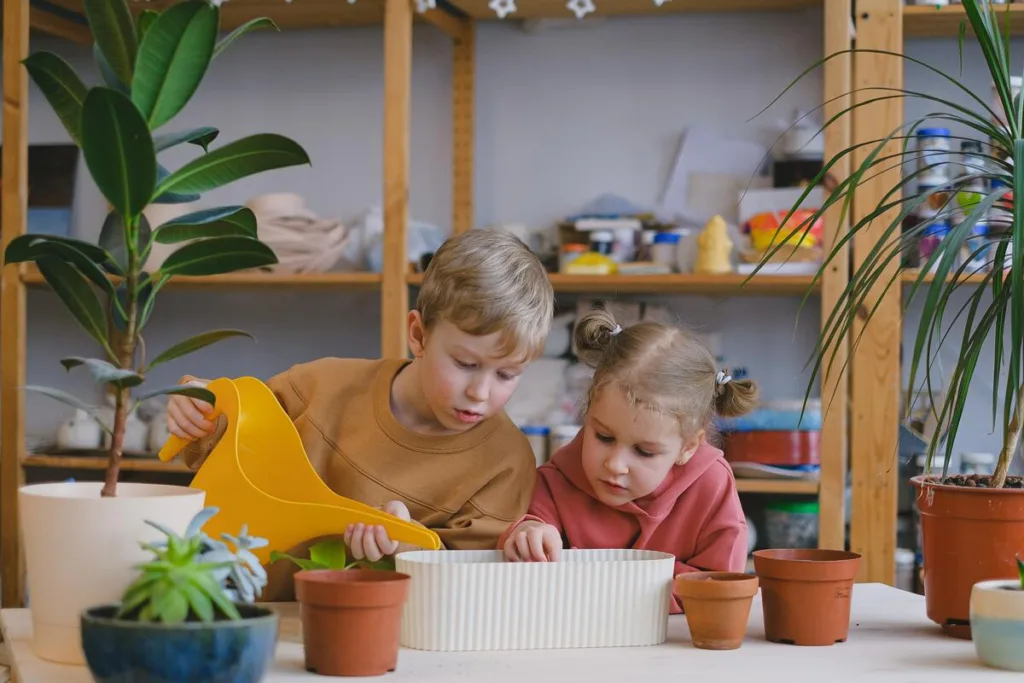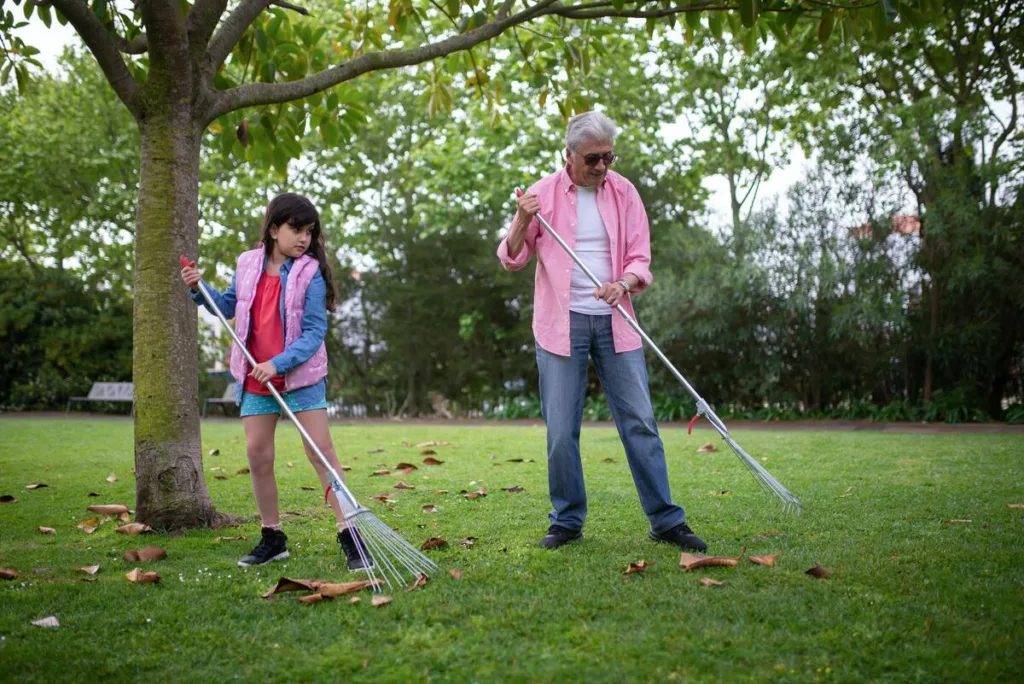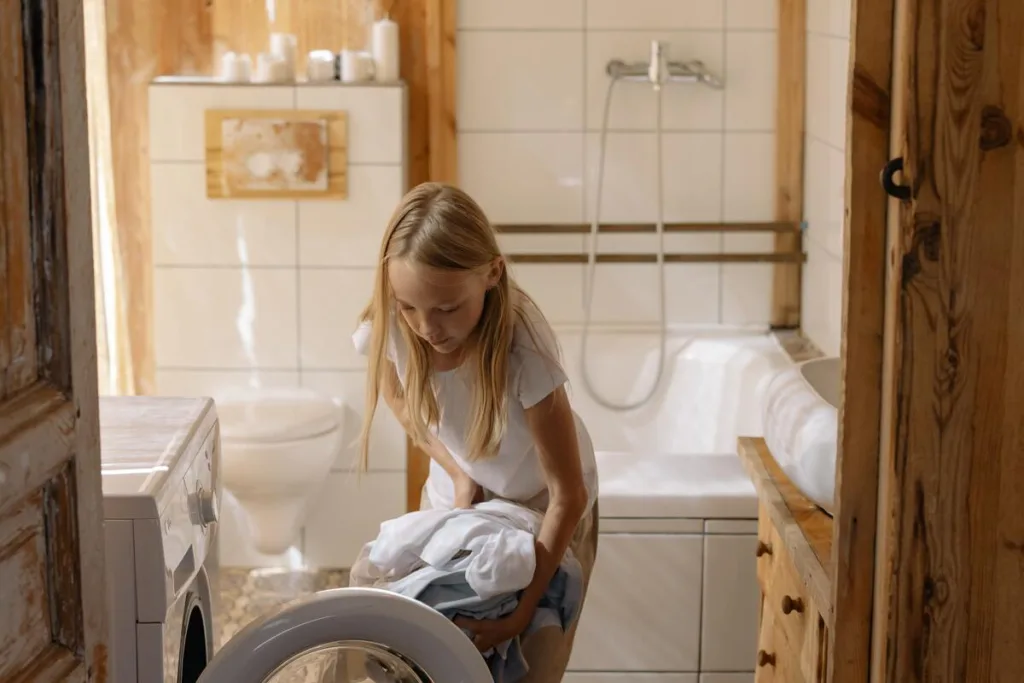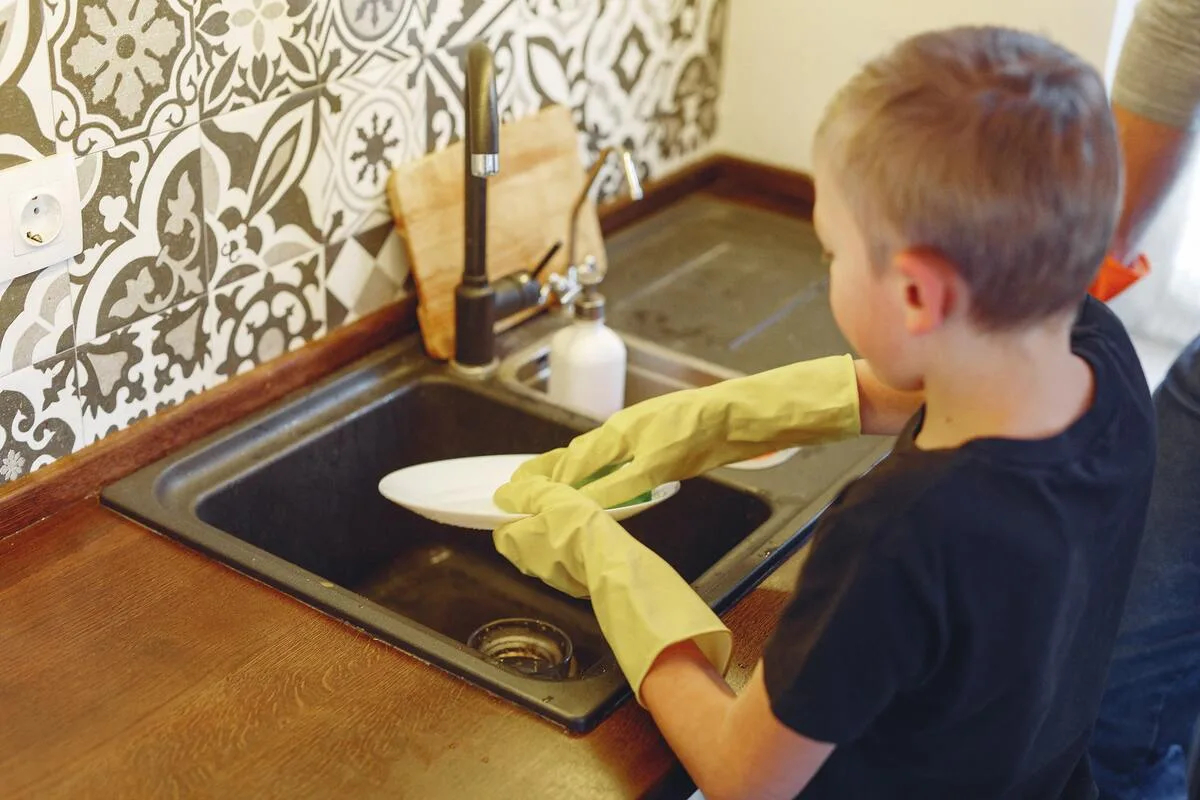Household chores build children’s responsibility, confidence, and independence and teach them important skills like time management, problem-solving, organization, and cooperation. However, in most cases, the very mention of ‘chores’ often elicits a chorus of groans, protests, or outright refusals from children. What could be the root of such widespread resistance, and what can we do as parents?
The Benefits of Chores for Kids
Assigning chores for kids is a powerful tool for raising responsible, confident, independent adults. These tasks are not just about tidying up spaces or organizing belongings; they are opportunities for children to learn vital life skills. Chores help kids understand their role in the family and instill a sense of responsibility from a young age.
Building Responsibility

Even from a young age, children are observant and quick to learn. Although they might not understand abstract concepts like rules and boundaries using logic, they are very good at grasping the concept of cause and effect. Children live in the present. Actions and immediate results are more readily understood than future outcomes. However, this doesn’t prevent them from starting to cultivate responsibility.
For example, telling young children to be “responsible for their toys’ might not be very clear to them. But they will easily understand that if a toy gets stepped on (the cause), the toy breaks (the effect); it’s a natural consequence.
Letting these natural consequences occur is a key step in fostering responsibility. At the same time, it is more energy-saving for parents than nagging and constant reminding. When children learn that their actions have direct results, they begin to understand the importance of their decisions. As their thinking abilities mature, they’ll start grasping the logic behind their actions and their corresponding outcomes. This understanding is crucial for them to become responsible.
Building Confidence
Science has shown that positive reinforcement can boost confidence, foster higher self-esteem, and maintain the desire to keep going. Hence, upon giving kids chores, a vital step is to offer genuine, thoughtful praise when completing tasks. Acknowledge their efforts and speak about the job well done. Don’t shy away from constructive feedback, either. Discuss the strengths they showcased and areas where they could make improvements. This conversation serves a dual purpose. First, it helps your child understand the expectations associated with their tasks. Second, it provides them with a roadmap for tackling chores more effectively in the future.
Using this feedback, children can grow more confident in handling their chores, knowing they can meet and even exceed expectations. Thus, chores, our help and feedback, are tools for our little ones to gain confidence in their abilities.
Building Independence
Believe it or not, we humans are naturally built to learn new abilities and get better at them. This isn’t just a feel-good phrase – it’s a fact proven by science. From the moment we are born, we all have a deep-down drive to understand and master skills. In our disadvantage lies the fact that this natural drive doesn’t come with a road map. It needs guidance, especially when we’re very young and still figuring out what’s safe and what’s not. Moreover, the moment we start saying “no,” “you’re not allowed,” or “you’re too young,” to our children, we could be blocking them from learning by experience.
So, how can we guide this natural drive to learn without standing in the way?
Assigning household chores is one of the answers. This can start early, with playtime. Toys that look like real-life objects can help kids understand how to use them, and these toys are safer and easier for small hands to handle.

Older children, as they get better at doing things, can start to take on daily chores that are appropriate for their age. These chores can start with picking up toys and can slowly include tasks like making their bed or cleaning their room. In the process, they learn to become responsible and self-reliant and gain a sense of achievement from completing tasks. As long as reward systems or the fear of punishments don’t replace a child’s natural drive, self-sufficiency and the quest for independence remain powerful motivators.
👉 Unlock the transformative power of ‘No’ in your parenting journey! Discover the importance of saying ‘No’ to your child and how to use it effectively. Dive into our article to enhance your parenting skills.
Nurturing Essential Life Skills
Chores for kids aren’t just about keeping the house tidy; they’re a tool for preparing them for real-world challenges. Chores help kids learn about time management, promote superior organizational skills, and teach problem-solving. Working together as a family fosters teamwork and responsibility. These are valuable life skills.
Children who regularly do chores learn that their contribution matters to the smooth running of the household. They learn to care for their environment and respect shared spaces. When siblings or family members work together to finish a task, they learn how to divide the work, collaborate, and communicate effectively. This team spirit can be beneficial in school projects and even in their future workplaces.
Age-Appropriate Chores for Kids
Parents can play a significant role in creating a fair system where each member of the family contributes to maintaining the home. Some of us may hesitate to assign chores to children, worrying they won’t clean up to a certain standard. However, each task a child is given, even if not performed perfectly, offers a chance to develop new skills and good habits. The only thing that needs to be taken into consideration is that chores for 7 year olds are different and more complex that tasks assignes for children that are younger. As they grow kids can be given more responsibilities.

Here are some examples of chores for kids by age:
- Toddlers (2-3 years): Simple tasks like putting toys away, picking up their clothes, or setting the table with unbreakable items under supervision. A visual chore chart can be posted on a wall to make things fun and teach them time awareness and sequentiality.
- Preschoolers (4-5 years): Assisting with making their bed, feeding pets, dusting surfaces, watering plants, or sorting dirty clothes.
- Elementary school children (6-10 years): Making their bed independently, folding clothes, emptying small trash bins, sweeping or vacuuming floors, helping prepare simple meals, or organizing their school supplies.
- Teenagers (11+ years): Chores for 11 year olds or older become more complex. They can take responsibility for their own laundry, cleaning bathrooms, mowing the lawn, washing dishes, cooking meals, managing a budget, or assisting with grocery shopping.
How to assign chores – efficient strategies

Chores don’t have to be a drag. In fact, they can be valuable learning experiences. To change how kids view chores, it’s important to treat responsibilities as a part of daily life. Age-appropriate chores for kids should be fairly distributed. Everyone in the house has to pitch in, building a sense of teamwork. When we look at chores this way, we can help kids see them as a chance to grow, take responsibility, and become more independent. Here are some efficient strategies for ensuring that chores get done:
- Set rules and boundaries – The first step in assigning chores is setting clear rules and boundaries. This means specifying what tasks each child is expected to do, when they should do them, and what the standards for completion are. Communicate these rules clearly and consistently so children understand their responsibilities.
- Keep tasks fair and age-appropriate – Chores for kids should be age appropriate. Not all tasks are suitable for all ages. Younger children can handle simpler ones, such as picking up toys or setting the dinner table, while older kids can manage more complex chores, like doing the dishes or vacuuming. Ensure the tasks are not too demanding for their age. It’s also crucial to ensure that responsibilities are distributed fairly among siblings to avoid any sense of favoritism or injustice.
- Offer predictability – Having a regular schedule for when certain tasks need to be done can offer children a sense of predictability and control. This could be as simple as making beds in the morning, taking out the trash on specific days, or cleaning rooms on weekends. A predictable routine helps children understand what is expected of them and allows them to plan their time accordingly.
- Model responsibility for personal items – Show your children how you take care of your personal items, like neatly storing your tools after use or promptly doing the dishes after a meal. This gives them a concrete example of what it means to be responsible for their own belongings. You can then translate this behavior to their tasks, encouraging them to take care of their own items as part of their chores.
- Nurture a sense of independence – While it’s necessary to supervise younger children as they learn to do their chores, it’s equally important to step back as they get older and allow them to complete tasks independently. This promotes self-reliance and confidence in their abilities. Allow them to make mistakes and learn from them.
- Use positive reinforcement – Reinforce your children’s efforts with praise and encouragement. Recognize their hard work and their progress, even if the task isn’t done perfectly. Positive reinforcement can range from verbal praise to small rewards like extra playtime or a favorite treat. However, ensure that the reward doesn’t overshadow the value of the chore itself.
Uncovering the Reasons Behind Children’s Reluctance to Do Chores
Chores often seem monotonous. Whether it’s doing laundry, washing dishes, or cleaning a room, these tasks repeat over and over, making them seem tedious. This feeling is even stronger when chores are used as punishment. If kids are told to do a chore because they’ve misbehaved, they see chores as unpleasant. Chores can start to feel like a heavy load rather than just regular tasks that help the household.
Chores – A Misunderstood and Misused Word
Most people, especially kids, don’t enjoy chores. The word ‘chore’ has a bad reputation. Although it describes the common household tasks that keep the home running smoothly, they can be seen as boring and tiring. They feel like dull, hard work that we have to do, even if we don’t want to. Hence, adding to the negative vibes.
These tasks, like doing the dishes, cleaning up rooms, or vacuuming floors, are important, but they’re not exactly fun. They take time, effort, and self-discipline, which aren’t things that kids usually find exciting. Over time, doing these jobs again and again, can feel really monotonous, leading to boredom and a lack of interest.
Plus, the fact that chores are mandatory makes them feel more like a punishment than a helpful part of daily life. When kids are ordered to do a chore instead of being asked to help out at home, it can lead to resentment and a dislike for chores.
Feeling Overwhelmed
Imagine instructing a child to simply “clean the room.” Assigning chores for kids using non-specific instructions can be confusing and discouraging as the child may not know where to start or what to prioritize. This might result in the child aimlessly moving toys around, leaving the books scattered, or overlooking the dirty clothes. The child could get quickly overwhelmed by the magnitude of the task, and instead of achieving a sense of accomplishment, they get frustrated.
You could start with, “Pick up all the toys and put them in the toy box.” Once that’s completed, the next task might be, “Now, let’s put all the books back on the shelf.” Then, “Can you put all the dirty clothes in the laundry basket?” By breaking the larger task into smaller, manageable actions, children can tackle one thing at a time, which is less overwhelming and makes them more productive.
A Desire for Autonomy
Having a clean home is something most of us enjoy, but what counts as “clean” can vary from person to person. For kids, understanding and achieving this standard can be even more complicated. They need to learn and master certain skills to keep things tidy. When we insist children clean in a specific way and within a set time frame, we might set them up for failure. This rigid approach can make kids feel like their efforts are never good enough, making them feel disconnected and unmotivated.

Ultimately, it shouldn’t be about having a spotless home all the time – a house where children live is never like that. It’s about teaching kids to take responsibility and understand the value of a clean environment. And to do this effectively, we need to consider our child’s development stage, their skills and allow for flexibility.
External Motivation – Earning Money Through Chores
Paying kids to do chores might seem like a good idea. We think it will motivate them to do their best and even believe it will teach them financial responsibility. However, once they grow up, no one will pay them for making their beds or doing the dishes. This creates a misconception about the nature of household chores. They aren’t just about responsibility. They play a vital role in maintaining our health and well-being. Just like we care for our bodies by maintaining personal hygiene or eating healthy, we also need to take care of our living environment.
While it’s important to start teaching financial responsibility early, we should consider choosing different tasks or activities for this purpose. The financial reward system should be tied to tasks or activities outside their regular home responsibilities. For instance, they could be encouraged to walk the neighbor’s dog, babysit, create crafts to sell, run a bake sale, or set up a lemonade stand. This way, they can learn about money management without confusing household chores with paid work.
👉 Ready to understand and manage your child’s attention-seeking behavior effectively? Explore our article for the top 5 strategies. Find out how to create a healthier, more balanced environment for your child!
Overloaded Schedules – No Time to Rest
Kids are full of energy, but they’re not machines. Expecting them to take on a cleaning task after a busy day can seem unfair. We need to make sure our expectations are realistic, scheduled appropriately, and suited to their age. Even as adults, we often leave deep cleaning for the weekend, especially after a tiring week.
Balancing their schoolwork, extracurricular activities, social life, and relaxation with household chores is vital. A manageable, consistent schedule that considers the child’s other activities and their need for rest is much more likely to foster a positive attitude towards chores. Otherwise, they might start viewing them as punishments rather than part of their daily responsibilities. Like adults, children also need time to unwind and relax.
Conclusion
Let’s look beyond the short-term cleanliness and organization of a completed list of chores for kids and acknowledge the substantial, long-lasting impact on ther lives. Be patient and assign appropriate chores from an early age. As they grow and reach specific milestones in their development, their skills will improve, and they’ll become a great help at keeping the home clean. Chores are the first step in developing essential life skills that will stay with them forever. Doing chores helps kids learn how to solve problems, make decisions, and stay organized. They also learn about responsibility, self-discipline, and the joy of finishing a task. Plus, they see that they play an important role in their family and their community.
Want to learn more about how to motivate your kids? Sign up for our “5 steps to get what you want for your child” online event, or chat with our friendly AI assistant, Sophie.
References
Bowes, J. M., Flanagan, C., & Taylor, A. J. (2001). Adolescents’ ideas about individual and social responsibility in relation to children’s household work: Some international comparisons. International Journal of Behavioral Development. https://doi.org/10.1080/01650250042000032
Coppens, A.D., Alcalá, L., Rogoff, B., Mejía-Arauz, R. (2016). Children’s Contributions in Family Work: Two Cultural Paradigms. In: Punch, S., Vanderbeck, R., Skelton, T. (eds) Families, Intergenerationality, and Peer Group Relations. Geographies of Children and Young People, 5. https://doi.org/10.1007/978-981-4585-92-7_11-2
Drummond, F., Coster, W. J., Rabelo Gomes, A. M., & Mancini, M. C. (2018). Children’s Participation in Household Tasks: Caregiver Importance and Satisfaction. OTJR: Occupation, Participation and Health. https://doi.org/10.1177/1539449218812711
González-Cutre, D., Sicilia, Á., Sierra, A. C., Ferriz, R., & Hagger, M. S. (2016). Understanding the need for novelty from the perspective of self-determination theory. Personality and Individual Differences, 102, 159-169. https://doi.org/10.1016/j.paid.2016.06.036
Klein, W., Graesch, A. P., & Izquierdo, C. (2009). Children and Chores: A Mixed-Methods Study of Children’s Household Work in Los Angeles Families. Anthropology of Work Review, 30(3), 98-109. https://doi.org/10.1111/j.1548-1417.2009.01030.x
Law, B. M., H. Siu, A. M., & L. Shek, D. T. (2012). Recognition for Positive Behavior as a Critical Youth Development Construct: Conceptual Bases and Implications on Youth Service Development. The Scientific World Journal, 2012. https://doi.org/10.1100/2012/809578
Legault, L. (2017). The Need for Competence. Encyclopedia of Personality and Individual Differences. https://doi.org/10.1007/978-3-319-28099-8_1123-1
Nieman, P., Shea, S., Canadian Pediatrics Society & Community Pediatrics Committee, (2004). Effective discipline for children. Paediatrics & Child Health, 9(1), 37-41. https://doi.org/10.1093/pch/9.1.37
Schuette, C., & Killen, M. (2009). Children’s Evaluations of Gender-Stereotypic Household Activities in the Family Context. Early Education and Development, 20(4), 693-712. https://doi.org/10.1080/10409280802206908
Tepper, D. L., Howell, T. J., & Bennett, P. C. (2022). Executive functions and household chores: Does engagement in chores predict children’s cognition? Australian Occupational Therapy Journal, 69(5), 585-598. https://doi.org/10.1111/1440-1630.12822









